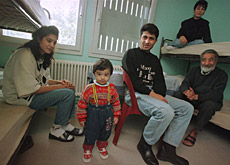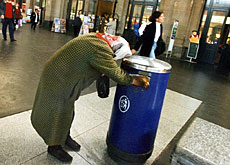Social aid abusers face fines in Zurich

Recipients of social aid in canton Zurich who abuse the system will be fined in future following a local parliament decision.
But specialists say administrative fines are just overkill and other measures are sufficient to deal with abuses of the social system.
On Monday Zurich’s parliament, led by the centre-right, decided to toughen the canton’s law on social aid, introducing special fines for abusers for the first time in Switzerland.
The left, which opposed these new measures, said current sanctions are sufficient and seriously doubted fines would stop people from trying to scam the social system.
These doubts are echoed by the Swiss association of welfare organisations. “We are very sceptical about these fines,” said the association’s secretary-general, Ueli Tecklenburg.
According to Tecklenburg, there is a whole raft of measures aimed at fighting abuses and that can already be applied today.
Measures
Beneficiaries of social aid who do not cooperate with the authorities, who make no effort to find a job or who do not take part in so-called integration programmes can see their benefit cut.
Abusers can also end up in front of a court if they conceal income from the social services, and they could face a spell in prison if they have falsified documents.
Making people pay fines could be a problem. “You’ll probably have to put people in jail because most of them can’t afford to pay fines,” Tecklenburg told swissinfo.
Welfare organisations say fines will only reinforce the impression that beneficiaries of social aid are fiddling the system and isolating poorer members of society.
According to their national association, only one to three per cent of those receiving social aid are actually cheating and that surveillance is more than sufficient.
The real problem, says Tecklenburg, is that the cost of social aid is rising because more and more unemployed people are finding it harder to get a new job.
Political decision
Measures similar to those in Zurich are being considered in a number of other cantons. Whether they will go ahead is another question.
“It’s a political decision and we will follow its effects with interest,” said Rolf Schürmann of canton Basel-City’s social affairs department. “But abuse is not a major concern for us.”
“What we really want to tackle are the causes of poverty and eliminate it.”
Schürmann told swissinfo that the Basel authorities do not take abuses lightly, but added that the number of cases is limited.
Some cantons and municipalities have already taken a police-like approach to social aid cases. The town of Emmen near Lucerne hired a “social aid inspector” last year to hunt down abuse but he has only turned up seven cases.
In canton Vaud, the government wants to double the number of its inspectors, saying the operation should save money by eliminating fraudsters and convincing others that abusing the system is not an option.
swissinfo with agencies
The Swiss constitution guarantees social aid for the needy, but leaves the cantons to distribute and manage it.
Swiss law says a person is considered in need if he or she cannot cover personal and family needs.
Social aid cover varies however from canton to canton, and even within cantons.
Basic social aid, which is not taxed, covers rental fees, basic health insurance, and a small sum for general costs.
Social aid is funded by taxes and the public purse.
Swiss social aid, once the exception, has been undergoing major change recently with more and more people relying on it.
An estimated 250,000 to 300,000 people receive social aid in Switzerland.
This figure does not include all those who could receive this aid, but decide not to.
The Swiss association of welfare organisations reckons a person is under the poverty line if they earn less than SFr2,480 ($1,900).
This figure reaches SFr4,600 for a family with children.

In compliance with the JTI standards
More: SWI swissinfo.ch certified by the Journalism Trust Initiative



You can find an overview of ongoing debates with our journalists here . Please join us!
If you want to start a conversation about a topic raised in this article or want to report factual errors, email us at english@swissinfo.ch.